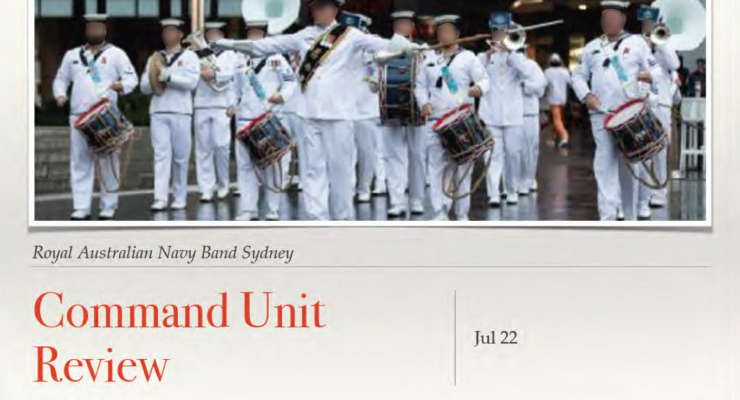
Members of the Royal Australian Navy (RAN)’s flagship band have been given an ultimatum by leadership: improve your attitudes, undergo a psychiatric evaluation or transfer out.
That’s one of the details revealed in documents released in response to a freedom of information request into the RAN Sydney band’s “known morale and cultural issues” going back a quarter of a century.
Its “approximately 50 full-time members” perform as a marching band, wind band, big band, jazz ensemble and even as a cover band doing contemporary songs. It offers ceremonial support, such as bugle calls and playing the national anthem, and performs at community events.
Slides from a monthly presentation by director of music Commander Cassandra Mohapp in 2022 show the band’s explicit mission is to improve public relations for the navy by promoting its values and presenting a positive brand.
“We contextualise this with our uniform and offer confidence and trust in their Australian military through the soft power of music,” notes accompanying the slides said.
The documents also reveal how COVID-19 caused problems for the band by impacting members’ postings and performances. “Let’s be frank, COVID has been crap for the band category,” Mohapp’s notes said.
An issue raised by the pandemic was vaccination. Some members refused to be inoculated (“DMUSN [director of music — navy] respects the decisions of those members who are choosing not to be vaccinated”) and Mohapp said those members would need to come up with “options” about how they would continue to serve despite their status.
References to efforts to improve the band’s culture are throughout the monthly divisional slides but are addressed front-on in an August 2022 presentation about a command unit review.

Notes prepared for a presentation about the review go into detail about the issues including:
- Recalling a conversation with an unnamed individual who said that the issues were “insidious and toxic” and that “25 years of bad habits and systemic issues” may not have answers
- Saying that the unit has been “hijacked by unfair negativity … bordering on dissent” that has made the workplace “unhealthy”
- Claiming that unnecessary complaining has become “a sport” for some members of the band: “The irony is that the people complaining about what is being said here, are the ones that don’t believe they are fuelling the problem”
- Lamenting that members are racing to get out of social functions for the band.

The review presentation leads into what it calls a line in the sand: members can either have a “positive change of attitude”, undergo a leadership-initiated psychological review for why they’re unwilling to change their attitude, or relinquish their position as full-time band members by becoming part-time.

The presentation’s notes say those who leave the band “will have support”.
The Department of Defence did not respond by deadline.








Well that’s all a big nothing
Agree. Sounds like many workplaces. Not news.
Let’s see what the Navy have to say before we condemn them.
Surely the Navy is not the only workplaces with too many whiny people with “issues”. And isn’t it also the case that they bring those issues to the workplace, they are not born there?
I’m surprised that you can apparently refuse to be vaccinated in the navy. Wouldn’t they make you walk the plank?
Disharmony in the workplace is almost a proverb. In most cases the bosses should look at themselves first. How did this particular workplace get so bad? Imposing a solution where the troops cop the entire burden may not solve the real problem.
Who said they didn’t?
I know it’s a slow news week given QE2’s demise, however this is a ‘dog bites man’ article. There’s no analysis or context provided.
Cam is always onto the rilly, rilly big issues…